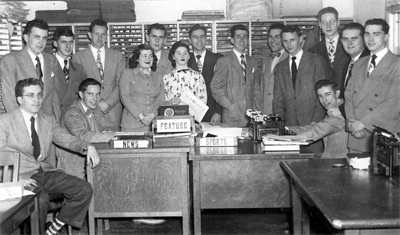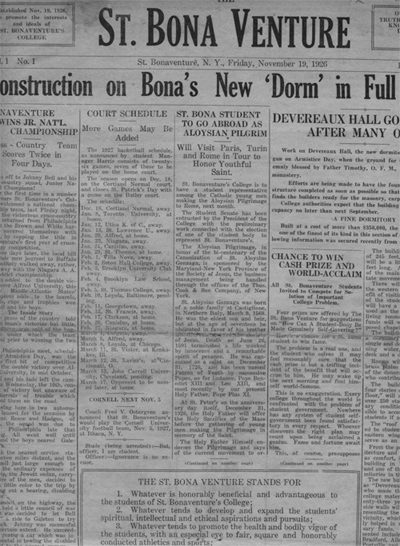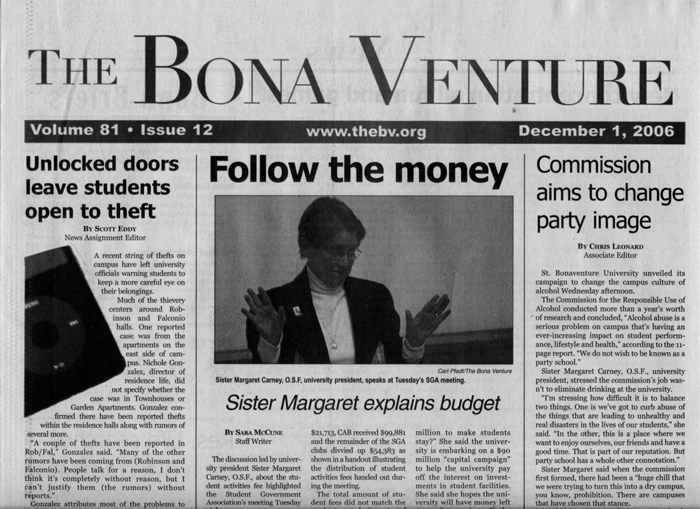The Bona Venture
“Truth, Knowledge, Duty, Justice, Sympathy”
The first issue of The St. Bona Venture was published on Friday November 19, 1926 and cost five cents. The St. Bona Venture was founded by Irving R. Bacon, a professor of English and Latin at St. Bonaventure's College. Under his supervision, it was established to promote the interests and ideas of St. Bonaventure's College. Before The St. Bona Venture was established, The Laurel was the official student publication of the college. In 1926, the St. Bona Venture took over responsibility for news reporting.
During WWII
the college temporarily ceased some student publications. The St.
Bona Venture was cut back to fewer pages, but continued
publication. After the war, The St. Bona Venture adopted a
shorter title, The Bona Venture, with its first issue printed on November 14,
1947.
|
|
|
| The first issue of The St. Bona Venture from November 1, 1926 | A modern day version of The Bona Venture from December 1, 2006 |
In 1953 guidelines for The Bona Venture defined the structure and purpose of the newspaper. Qualifications for Editor and Managing Editor, Applications for Positions, Selection Procedure, Resignation and Removal, and Appointment and Role of the Faculty Consultant were outlined. The guidelines were shared and signed by the University President, Editor-in-Chief, Faculty Consultant, and Moderator.
The Bona Venture is the official campus newspaper. It is published by St. Bonaventure University, but is independent of any academic school or department. The purpose of The Bona Venture is contained in its masthead, "to promote the interests and ideals of St. Bonaventure University." This includes the be-all and end-all of the University: that the ideals of this University are to promote thinking, mature, and critical students. The Bona Venture shall serve as a teaching and laboratory aid in journalism for all students; providing practical experience in citizenship, and communications and acting as the voice of the students, faculty, administration, and other interested persons.

The guidelines stated that the positions of editor-in-chief and managing editor were open to seniors and juniors. All other things being equal, preference was given to a senior. An academic index of 2.0 was required for appointment to editor-in-chief or managing editor. Candidates were required to have four semesters of work on The Bona Venture, and at least one semester spent in an executive position. An application was also required for students who desired the position of editor-in-chief or managing editor. The editor-in-chief and managing editor were selected by the outgoing editor-in-chief in a required consultation with the faculty consultant. In the event that these two persons could not reach an agreement, the moderator of The Bona Venture intervened as a mediator. The faculty consultant, in consultation with the moderator had the authority to remove the editor-in-chief. If the editor-in-chief should decide to resign his post, he submitted his resignation to the faculty consultant. In the event of the resignation of the editor-in-chief, the managing editor would assume that position.
Duties and Responsibilities
1. Shall act as a liaison between the University President and the faculty adviser/consultant and the editor-in-chief.
2. Shall join with the editor-in-chief and the faculty adviser/consultant in meetings to discuss the operation of the newspaper.
3. Shall insure the operation of the newspaper as part of a free, responsible press in accordance with the canons of journalism outlined in the April, 1923 code of the American Society of Newspaper Editors.
4. Shall advise the faculty adviser/consultant and the editor-in-chief on the administrative operations of the University,
1. Shall act as a liaison between the moderator and the editor-in-chief and the managing editor.
2. Shall critique the issues of the newspaper and proffer his professional guidance to the editor-in-chief on the operation of the newspaper.
3. Shall insure the operation of the newspaper as part of a free, responsible press in accordance with the canons of journalism outlined in the April, 1923 code of the American Society of Newspaper Editors.
4. Shall advise the editor-in-chief, managing editor and business manager on the financial operation of the newspaper.
1. Shall be directly responsible for the efficient operation of the entire newspaper, its content and its staff.
2. Shall determine all editorials in conjunction with the editorial board, but the final decision shall be the editor-in-chief's.
3. Shall supervise the work of the entire staff through the editors.
4. Shall be responsible for the advertising layout for the entire newspaper. Once the ads are placed on the page, they may not be moved without the permission of the editor-in-chief.
5. Shall insure the operation of the newspaper as part of a free, responsible press in accordance with the canons of journalism as outlined in the April, 1923 code of the American Society of Newspaper Editors.
6. Shall work closely with the managing editor regarding the overall operation of the newspaper. Occasionally the editor-in-chief shall review and examine the performance of all members of the editorial board.
7. Shall, whenever possible, aid the associate editor with proofreading.
8. Shall call weekly meetings of the general editorial board to critique the previous issue and plan the subsequent one. The general editorial board shall consist only of the editors and their assistants. Other persons may be admitted to the meetings only with the editor-in-chief's permission.
9. Shall call executive editorial board meetings which shall consist of the editor-in-chief, the managing editor, the associate editor, the news editor, and the editorial page editor to conduct the preliminary work on editorials (gathering ideas, researching and writing) and to handle whatever business the editor-in-chief presents.
10. Shall meet with the moderator and faculty adviser/consultant at the discretion of the editor-in-chief to discuss the operation of the newspaper and shall meet with them whenever they extend an invitation.
The university provided regulations for the operation of student publications maintaining overall editorial control.
1. In the case of each publication, the Moderator under the committee is the final and responsible arbiter. In addition to the over-all supervision, specific concern with such matters as policy, morality, text, rhetoric grammatical correctness, pertain to the Moderator.
2. The Faculty Advisor has supervision over all the technical aspects of the publications.
3. The Chairman of the Committee has the supervisions over all the financial and business aspects of each publication.
4. All policy for any publication must be in accord with the over-all policy determined by the Committee, and the Committee, through frequent meetings and consultations, which safeguard the observance of policy, make changes that are necessary, and settle disputes.
04/02/2007

